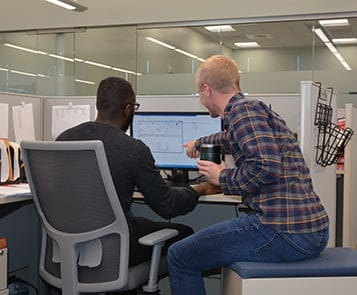6 Conditions that Should Trigger a Waste Disposal Process Review
As an operations, facilities, environmental, health, or safety manager, are you responsible for handling the waste that your company generates? If so, perhaps it’s just discarded papers, cardboard, or similar by-products. On the other hand, you may be overseeing hazardous chemicals or industrial wastes that require specialized management and disposal.
Waste management errors or noncompliance can risk employee safety, company reputation, and your bottom line. Proactively addressing any issues will avoid or minimize these risks. Also, you can view such a review as an opportunity to improve processes, reduce errors and inefficiencies, and cut costs and effort. With that in mind, we offer six drivers whose presence indicates it’s time to review your waste disposal plan—and if necessary, improve it.
1. You Don’t Have a Current Waste Disposal Snapshot
Has your company added a new process, business line, or set of procedures that may be impacting your waste generation? Even routine company growth can introduce undocumented and noncompliant new waste practices in your facility (see below).
In any case, it’s crucial that at every step in your operations you know the current sources, quantity, and composition of waste. This is always core to having a successful waste management program. It involves accurately determining the profile of every waste stream—and sharing this information with your waste disposal vendor, transporter, or Treatment, Storage, and Disposal Facility (TSDF). This way, these partners will have all the data needed to securely manage your waste during its full lifecycle.
Waste generators must certify their profiles annually and send them to their TSDFs for review. It’s therefore crucial these profiles are up-to-date and accurate. Many changing or growing companies don’t reevaluate or revisit their historic waste management processes.
This habit also leads to lost opportunities. Regularly reassessing and revamping your waste management programs, as needed, is a great way to maintain your company’s operational health. Review enables managers to quickly find ways to cut waste and apply new time- and money-saving technologies and processes. It’s also an opportunity to ensure your protocols align with industry best practices—as well as internal mandates or certifications.
2.Your Generation Status Has Changed
Hopefully, your company is growing and increasing revenue and profits. Perhaps you are a small or midsize business becoming an enterprise—or a large company growing out a new business line. However, if you are expanding, not only are you possibly adding new types of waste streams, but you’re increasing waste stream volume, as well. If so, this will require taking on new waste management responsibilities.
Often, a growth spurt will require you to update your status from Small Quantity Generator (SQG) to Large Quantity Generator (LQG). This is a crucial distinction, as an LQG faces additional regulatory and reporting requirements—and potential fines for violations.
Growth can also lead to bad improvisations. A company department (trying with existing resources to keep up with growth) may suddenly stop following operational best practices—particularly when it comes to waste segregation and storage. Some personnel may even introduce short cuts—such as non-compliant onsite waste management practices or disposal. This leads to environmental damage and the creation of new workplace hazards—just the sorts of bad practices that trigger penalties during inspections or audits.
3. Your Program Lacks Key Stakeholder Input
The successful execution of long-term waste disposal programs requires the regular input of key experts and stakeholders, both inside and outside of your company. Are your experts currently involved? Did they help plan and execute the existing programs? The stakeholder teams should include your various department representatives or managers, as well as members of local regulatory agencies. Together, they can partner to create and maintain a solid foundation that supports a productive waste management program.
For this stakeholder partnership to succeed, you must often select as participants members of the following groups: waste management, transportation, sanitation, emergency response, environmental health, public health, public works, zoning, agriculture, and industry. Also, don’t leave out business stakeholders—they can help ensure there is clear communication among the various partnership members. This will assist in the identification and avoidance of any potential waste management and disposal errors.
4. Waste Minimization Isn’t a Company Priority
There are many compelling reasons to prioritize waste minimization: for instance, reducing your company’s environmental impact can boost your reputation—while creating upfront cost efficiencies. Adopting the most efficient and sustainable methods will let you get more use out of your supplies—and reduce your materials purchasing spend. Source reduction also saves waste generation costs and cuts down on management liabilities—making it preferable than back-end recycling and treatment methods.
Ultimately, waste minimization efforts can lead to a big boost in your bottom line. And there are other potential benefits, such as improvements in production efficiency; the enhancement of brand image; and a reduced environmental impact overall. Source reduction is the most effective way to preserve human health and the environment—it can also improve compliance (in California, SB-14 requires LQGs to have a waste minimization plan, for example). All these are great reasons to prioritize waste minimization and pair this sort of program with your waste disposal efforts.
5. Your Documentation Is Outdated and Paper-Based
Regulatory reporting requires accurate records. This is especially true during an inspection when an auditor requests a document review. Documentation subject to review includes manifests, profiles, waste determinations (Safety Data Sheets and analytical tests), written compliance training programs, onsite support services programs, and routine internal paperwork. If your records or documents are paper-based, and created and maintained inconsistently by different teams or employees, you are risking noncompliance and a less than favorable audit result.
It’s become a waste disposal management best practice to keep as many records as possible securely online and easily retrievable for presentation. Today, there are proven software systems that streamline compliance reporting for key tasks, such as hazardous waste disposal. Such a solution can guide your company to input key data into the proper forms. The software then saves all the documentation for later environmental health and safety compliance reporting and data analysis, as well as for the generation of key performance metrics.
6. Your Sustainability Goals Have Evolved
It’s likely your company—in responding to market, statutory, or other changes—regularly revises its sustainability goals (including waste minimization—see above). As the company changes waste management objectives, it’s important to update related processes to match them. Your stakeholders must actively synchronize waste management operations with the company’s sustainability targets. Also, you must share these goals with those colleagues who actually generate the waste. This way, they can promote solutions for waste minimization.
Waste Disposal Review: Opportunity for Improvement
We’ve covered only a handful of situations which should trigger a review of your waste management practices. Nevertheless, for benchmarking purposes, periodically checking up is always a good idea: it’s necessary to capture a snapshot of your company's wastes, its management procedures, and the estimated expenses.
Without reviewing your practices, you can’t improve existing processes, cut their costs, and maintain strict legal compliance. Any information gathered can also help shift waste management efforts from disposal-focused approaches to ones that emphasize waste minimization and recycling.
Want to learn more? Call us today at (866) 505-7988 to speak to an expert. Or click the button below for more details on our Waste Recycling & Sustainability capabilities.







